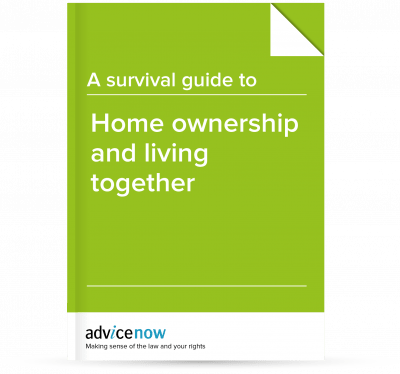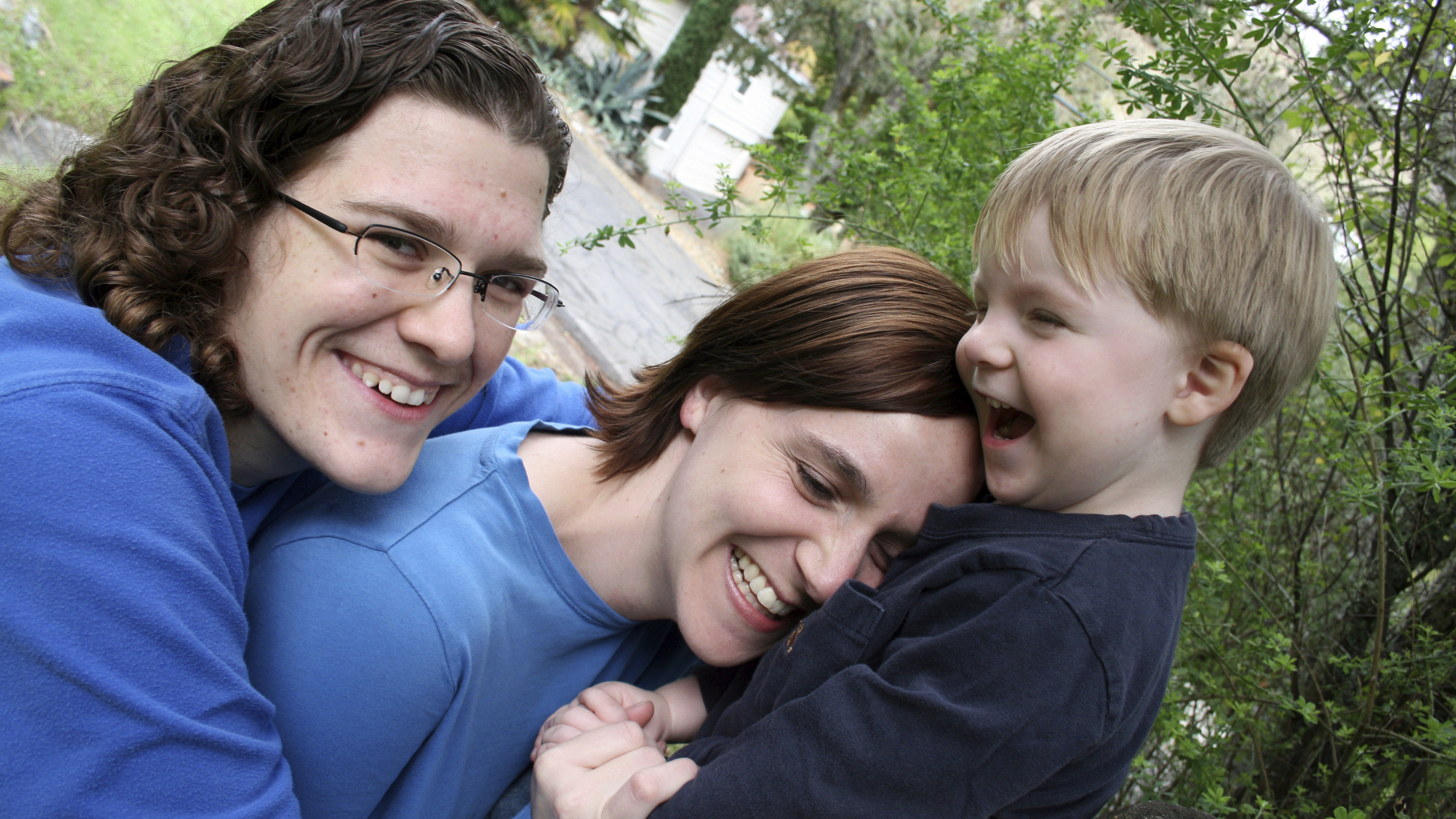Where only one person owns the home - known as sole ownership
If your home is owned by someone else in just their name, this legal arrangement will probably only be right for you if you understand that you do not own a legal share of the home.
If you do make financial or other contributions, for example, by giving up paid work to raise the children, you may be able to say you have a beneficial interest in the home. But, if the other person doesn’t agree with you on this, you would have to go to the civil court. These types of cases are complicated and therefore expensive and stressful and the outcome can be uncertain. So, this makes it a risky situation all round.
The best plan is to agree what would happen if you break up, write it down in a Living Together / Cohabitation Agreement, and keep it safe.
Remember whoever owns the home also needs to make a Will. Without a Will, if the person who owns the home dies, the home will go to their nearest relative in line with the intestacy rules.
You could be in a very long-term serious relationship, and even have children together, but if your partner dies without you being married or in a civil partnership and without having made a Will, anything they own will go to a relative and not you. This could even be your partner’s wife, husband or civil partner, if they have one that they are separated but not divorced from! This may well not be what either of you want. It is very likely to leave you and any children in a risky situation when it comes to having somewhere to live.
This legal arrangement may well not be right for you, if both of you are paying the mortgage or making other contributions (for example, if you are the non-owner and you earn less because you spend more time caring for the children). If you have children, then owning the home together will make things more secure for them. If, for example, you break up and you do not own the home but you are the main carer, you and the children will need to find somewhere else to live. The only way round this is if you can agree a different arrangement or show, by going to court, that you should have a share of the home based on complicated and expensive arguments about property law.
We explain more about the law and your options, depending on your situation, in our guide about what to do if you break up with someone you live with.
What to do if one of you owns your home and you think it should be in both names
It might feel like a tricky topic to bring up with your partner, if you are the non-owner, but think it would be better if you owned the property together. Even if it is a difficult thing to discuss, it will probably be better to do it now and try and sort things out. Otherwise, you could end up breaking up and ending up with no home or, if your partner dies without a Will, you could end up with no partner and no home! If you possibly can, try and get a written record of what you manage to agree, even if it is only an exchange of emails or text messages.
It might be that you own the home in just your name - you need to think carefully about the reasons why you might want to change the legal situation. It could be because you are now in a serious relationship and you want to share your home with your partner permanently and put this on a legal footing. Do be sure to get independent legal advice before you make any big decisions.
You need to fully understand the impact on your legal rights if you agree to change how you own your home.
It is a good idea for you both to get separate legal advice about this. If you do this, decide carefully how you want to own your home and in what shares. Bear in mind, if there are two owners you can only sell a home if both agree or if a court orders that the home must be sold. If there is a mortgage on the home and you change the arrangement from one of you owning it to you both owning it, the mortgage company will need to agree to the change too.
Sarah’s story
Sarah (43), met her partner 19 years ago when she and her two-year-old daughter were living in local council accommodation. Recently divorced and living with his parents, Sarah’s new partner soon moved into her home. He was developing a new property that he owned at the time and she started to contribute to the cost of the improvements.
Sarah’s partner was self-employed and she began to help him expand the business. She was never paid as he said there was no point - ‘it was all going into the same pot, they were both working for the good of the family’ - and he was already registered for VAT and tax.
After four years together, Sarah became pregnant so she and her partner decided to move into her partner’s newly developed home and Sarah gave up her house. Sarah knew the house was just his, legally, so she suggested adding her name to the house as well. He insisted that it would be too much trouble and expense. He also said he didn’t want to get married again.
After 16 years together, the business started going downhill. Sarah’s partner became depressed, which lead to outbreaks of abusive and aggressive behaviour, so she decided to leave him. She believed she would be protected by the law as his ‘common law wife’. However, as there is no such thing as a common law husband or wife in English law, she was not protected. The only possible option was a complicated and expensive claim in the civil court where the outcome was uncertain. Sarah couldn’t afford this and so she and her daughters were left homeless with little option but to sleep on her mother’s floor, while her ex-partner continued to live in the home and benefit from its value that she had contributed to over many years.
When I discovered I had no legal rights to my home I couldn't believe it, I thought it must be a mistake. Losing everything left me completely devastated. Knowing what I know now, I would have definitely made sure that my name was on the deeds, you have to make sure you cover yourself.
Sarah
Where you own your home with your partner as beneficial joint tenants
This legal arrangement will be right for you if you are paying the same amount toward the deposit or mortgage. And you want the home to go to your partner when you die.
You might want this legal arrangement even if you are not contributing equally. If you are in a committed relationship, perhaps with children too, and you agree that you should have an equal standing in the home, regardless of the financial contributions you are making, this will be the right legal arrangement.
This is not likely to be the right arrangement if you are paying more of the deposit or mortgage than your partner, and would want more than half if you split up. Or, if you want to leave your half to somebody else when you die, such as older children from a previous relationship.
What to do if you think it would be fairer to own your home as tenants in common
If it would be fairer to own your home as tenants in common, you can easily change it. If you both agree, you can also change the shares you each own.
To end a joint tenancy you need to fill in a form called a ‘Notice of Severance’ and make sure the other person receives it. By doing this, you change the beneficial joint tenancy into a beneficial tenancy in common in equal shares, regardless of what contributions you both made. There is information on how change the beneficial ownership in this way on the GOV.UK website. But, it is a good idea to get help from a solicitor if you decide to do this. For more on this go to the section called More help and advice.
You can find more useful information on how to change the way you own your home with someone else on the GOV.UK website.
Where you own your home as benficial tenants in common
This legal arrangement is likely to be right for you if you are paying different amounts toward the deposit or the mortgage, and want a fair return on your money if you split up. Or, if you want to leave your share of the home to your children or somebody else, rather than your partner who you own the home with. You might want to own the home this way if you are both putting the same in, but aren’t sure that you want each other to inherit your share if one of you dies.
If you want your partner to inherit your share, you must make a Will. To protect yourself and your partner if one of you dies, you can both make a Will leaving your share to the other. That way, you will have the same protection as if you were beneficial joint tenants.
This arrangement can also protect your partner if you are ever declared bankrupt, because only your share will be counted as one of your assets (although not if you had done this intentionally, because bankruptcy was likely).
This arrangement won’t be right for you if you want to own the home as a whole, together (whether you put in the same amount financially or not). It won’t be right for you if you haven’t made Wills but you want to make sure, if one of you dies, the other one can stay living in the home securely, as the owner. But, as explained above, you can make Wills to protect each other.
What to do if you think it would be fairer to own your home as beneficial joint tenants
If you have unequal shares in your home and it doesn’t seem right to you anymore, you can change the way you own the home, but only provided you both agree. You will need to see a solicitor to help you with this. See the section called More help and advice.
You can find more useful information on how to change the way you own your home with someone else on the GOV.UK website.




